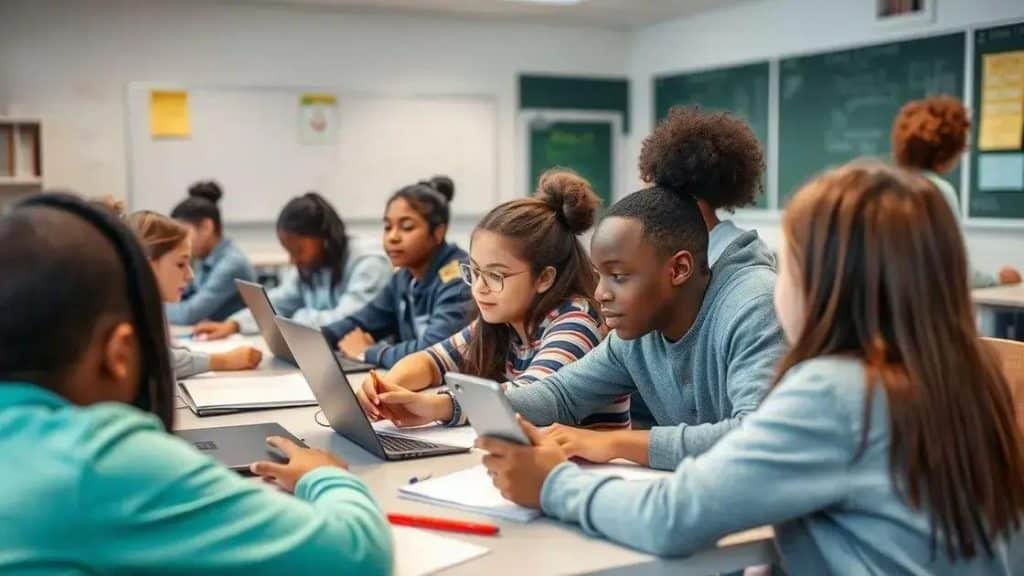Digital literacy required in 2025 curriculum: what to expect

Anúncios
Digital literacy required in the 2025 curriculum involves teaching critical skills such as online communication, information evaluation, and digital citizenship to prepare students for future careers and responsible participation in a technology-driven society.
Digital literacy required in 2025 curriculum is more than just a trend; it’s becoming a necessity in education. Have you considered how these changes might influence learning outcomes for students? Let’s dive into what this means for the future.
Anúncios
Understanding the need for digital literacy
Understanding the need for digital literacy is crucial in today’s technology-driven world. As we move closer to 2025, it becomes imperative to equip students with the skills necessary to thrive in a digital landscape.
Why Digital Literacy Matters
Digital literacy is not just about knowing how to use devices; it’s about navigating the vast information online effectively. This skill helps students distinguish between credible sources and misinformation.
Anúncios
Key Components of Digital Literacy
- Critical thinking skills to analyze information
- Understanding of online privacy and security
- Ability to communicate effectively using digital platforms
- Gathering and evaluating data from diverse sources
These components form the foundation that students will rely on for their academic and professional futures. Digital literacy enables them to engage with technology meaningfully and responsibly.
Furthermore, being digitally literate means being adaptable. As technology evolves, so too must our approach to teaching these essential skills. We need to foster an environment where students feel comfortable exploring the digital world.
Creating Engaging Learning Experiences
Incorporating digital literacy into the curriculum can be achieved through project-based learning and interactive activities. These strategies allow students to apply what they learn in real-world contexts.
- Using simulations to practice online research
- Collaborating on digital presentations
- Engaging in discussions about digital ethics
By understanding the necessity of digital literacy, educators can create a curriculum that not only prepares students for the future but also empowers them to be informed, engaged citizens.
Key skills for digital literacy

To thrive in a digital world, students must develop several key skills for digital literacy. These skills go beyond basic computer knowledge and involve a deeper understanding of the digital landscape.
Critical Thinking
Critical thinking is essential for analyzing and evaluating information online. Students need to question the validity of sources and recognize biases. This skill enables them to sift through the vast amounts of information available and identify reliable content.
Online Communication
Effective online communication is another vital area. Students should learn to express themselves clearly through emails, social media posts, and online discussions. Digital literacy includes understanding digital etiquette and how to interact respectfully with others online.
- Utilizing clear language in messages
- Being aware of tone and context
- Respecting differing opinions
- Collaborating on digital platforms
These elements prepare students for meaningful interactions in both academic and professional settings. As they interact more online, the ability to communicate effectively helps build strong relationships.
Information Literacy
Another crucial skill is information literacy. This involves knowing how to search for, retrieve, and utilize information responsibly. Students should understand how to cite sources correctly and avoid plagiarism. Moreover, this skill empowers them to contribute content ethically in digital forums.
Finally, digital citizenship is fundamental. Students must grasp the importance of being responsible, safe, and respectful online. They should learn how to protect their personal information and understand the implications of their digital footprints.
Overall, mastering these key skills for digital literacy equips students to navigate a complex digital environment effectively, enabling them to become informed and responsible digital citizens.
Integrating digital literacy in classrooms
Integrating digital literacy in classrooms is essential for preparing students for the future. It allows them to navigate the digital world responsibly and effectively. When these skills are woven into everyday learning, students become more than just passive consumers of technology—they become proactive creators and thinkers.
Strategies for Integration
One effective strategy is incorporating project-based learning that emphasizes digital tools. For example, students can work on assignments that require research via online databases or the creation of digital presentations. This approach not only engages them but also helps develop critical research skills.
Using Collaborative Technologies
Another way to integrate digital literacy is by utilizing collaborative technologies. Tools such as Google Docs or online forums encourage students to work together on projects. This collaboration fosters teamwork and allows them to learn how to communicate effectively in digital environments.
- Encouraging group discussions in online platforms
- Implementing peer reviews using digital tools
- Promoting the use of cloud storage for sharing work
- Using video calls for group projects
As students engage with these technologies, they build vital skills in online communication and collaboration. Furthermore, educators can incorporate lessons about digital ethics, such as copyright and plagiarism. Understanding these concepts ensures that students respect the work of others and learn to contribute ethically online.
Teachers can also design assignments that require students to analyze digital content, such as articles or videos. These assignments challenge students to think critically about the information presented and understand how to evaluate its credibility.
By embedding digital literacy into various subjects, educators not only enhance learning but also prepare students to be competent and responsible digital citizens. This preparation is vital in a world that increasingly relies on technology for everyday tasks.
Future implications of digital literacy

The future implications of digital literacy are vast and far-reaching. As technology continues to evolve, the ability to navigate digital spaces effectively becomes increasingly important. Students equipped with strong digital skills will have greater opportunities in various fields.
Career Readiness
In many professions today, digital knowledge is essential. Future employers will expect candidates to have a solid understanding of digital tools. Skills such as data analysis, digital marketing, and coding will be in high demand. Preparing students with these abilities can open doors to numerous career paths.
Social Engagement
Moreover, digital literacy fosters informed civic engagement. As more discussions and movements happen online, being digitally literate allows individuals to participate meaningfully. Being able to assess information critically helps prevent the spread of misinformation. Students who understand how to use digital platforms can advocate for causes they believe in.
- Engaging in digital activism
- Accessing reliable sources for information
- Creating content to raise awareness
As they learn to express their views online, they contribute to a more informed society. Additionally, understanding privacy and security will aid them in protecting their personal information.
Continuous Learning
The landscape of technology is always changing. Therefore, digital literacy cultivates a mindset of continuous learning. Students will learn to stay updated with new tools and trends, ensuring they are adaptable in their careers and personal lives. This ability to learn and adapt is vital in a world where technological advancements occur rapidly.
Lastly, the integration of digital literacy in education prepares students for a future that heavily relies on technology. As they gain confidence in navigating various platforms, their overall problem-solving skills improve.
FAQ – Frequently Asked Questions about Digital Literacy
Why is digital literacy important for students?
Digital literacy is crucial for students as it helps them navigate the digital world, prepares them for future job opportunities, and encourages responsible online behavior.
What skills are included in digital literacy?
Key skills in digital literacy include critical thinking, online communication, information literacy, and understanding digital citizenship.
How can schools integrate digital literacy into their curriculum?
Schools can integrate digital literacy by using project-based learning, incorporating collaborative tools, and providing lessons on digital ethics and online safety.
What are the future implications of digital literacy for society?
The future implications include creating informed citizens, promoting continuous learning, enhancing career readiness, and fostering meaningful social engagement.





